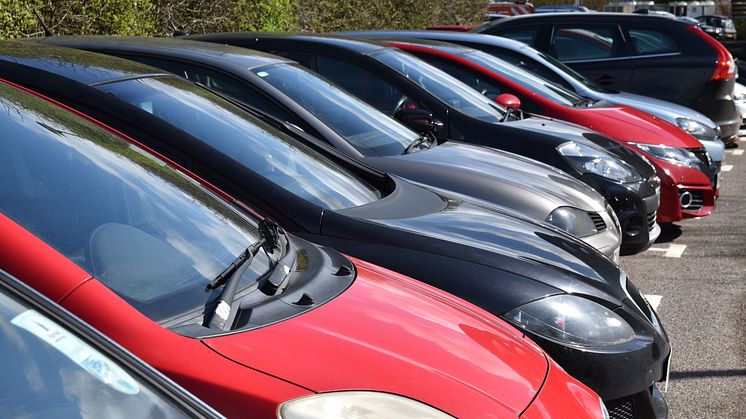Press release -
Motorists demand end to ‘self-policing’ by private parking industry
The RAC is backing Sir Greg Knight MP’s private member’s bill to tackle rogue private parking companies head on by introducing better regulation to protect motorists, as research shows overwhelming support for such proposals.
The Parking (Code of Practice) Bill 2017-18, which had its first reading in July, aims to reform unfair parking practices by introducing a legally binding code of practice, which could ultimately lead to a fairer appeals process and an end to aggressive debt management.
Evidence presented by Sir Greg from RAC Foundation research showed that 4.7 million vehicle records were handed over by the DVLA to private parking companies in the year to April 2017, a 28% increase on the previous year and a record high.
Back in March 2015 the Department for Communities and Local Government launched a discussion paper looking at unfair parking practices; however their conclusions are yet to be published. The RAC has repeatedly called on the Government to introduce better regulation of the largely unregulated private parking sector so the organisation is welcoming this initiative from Sir Greg which has received broad cross-party support.
The bill’s introduction will also be supported by drivers. Research conducted by the RAC shows the strength of feeling among drivers with three-quarters of 2,194 motorists (73%) surveyed demanding the sector should fall under government regulations rather than continuing to ‘self-police’ through membership of a trade association.
Motorists’ perceptions of private parking operators’ priorities are clear, with the belief they are only interested in making money being the most popular view – supported by six in 10 (62%) of motorists questioned by the RAC.
Nearly half (45%) said enforcement policies are too heavy-handed and more than a quarter (28%) think there is no justification for the way private parking operators enforce their rules. Only a tiny 4% think their charges are fair and their conduct reasonable, though a fifth (21%) accept that private parking operators are necessary to stop a parking free-for-all.
Opinions of private parking charge notices could not be clearer with three-quarters of motorists (73%) saying they understand that such charges may be necessary, but generally they are excessive or disproportionate for the level of parking contravention. Of the remainder, a fifth (21%) claim that any penalty charges are wholly unacceptable and only 6% would go so far as to say the amounts are reasonable.
Asked what they would like to see emerge from potential regulation, around nine in 10 motorists cited penalty charge capping (91% in favour); guidelines for penalty charge amounts (88% in favour) and action to prevent aggressive enforcement (90% in favour).
Nearly one in five (16%) of drivers surveyed said they had received a parking charge notice from a private parking company, but while 38% (of the 16%) decided to pay straightaway a determined 62% decided to appeal against the charge. Of those who appealed, 60% said they were successful in getting the notice reduced or cancelled. And of those remaining, half lost their battles and paid up while the indignant other half said they still refused to pay.
Sir Greg Knight MP said: “Following the ban on wheel clamping in 2012, private parking providers are now issuing a ticket every seven seconds – many of them in dubious circumstances.
“Some dodgy operators are engaging in practices including ‘ghost ticketing’ – the use of CCTV to spot parking infringements and issue parking charge notices, unclear and ambiguous signing and issuing tickets despite malfunctioning parking payment machines. Currently, there is no legally binding, mandatory code of practice.
“Of course private landowners have rights, but when landowners invite people to park on their property the rules need to be fair to both parties. Time and again I hear horror stories from motorists, so this bill will reform unfair parking operator practices. It will oblige anyone who wants to run a car park on private land to operate in a fair and reasonable way that respects the rights of all involved.”
RAC parking policy spokesman Nicholas Lyes said: “The strength of feeling is clear – motorists want the sector cleaned up and for self-regulation to end. With scandals such as ghost ticketing and hugely aggressive debt management systems, there urgently needs to be a set of national minimum standards.
“We have been calling on the Government to do the right thing for some time now. That’s why we are giving our wholehearted backing to the private member’s bill tabled by Sir Greg Knight MP. It is ludicrous that an industry with such a poor reputation is allowed to self-regulate without a shared minimum code of practice or an effective independent appeals process.
“Drivers who receive tickets and fines from parking operators in dubious circumstances are also frustrated that these operators who are members of trade associations appear to have unrestricted access to the DVLA database so there is clearly a need to reassure the public that they are meeting robust and transparent conditions before personal information is released.
“Due to the strength of feeling from motorists we believe that Sir Greg Knight’s bill warrants the full support of MPs from across all the parties and we are confident that this will be carried through into law. It will be popular and consumer friendly because, quite simply the overwhelming consensus from motorists is that they have little or no faith in private parking operators and therefore believe that further government regulation is needed to protect motorists from questionable practices.”
Should the bill be passed, the RAC believes that to raise consumer confidence in the guidelines must address the following areas:
- Minimum standards of conduct which would include a set of enforcement standards, improved conditions for access to the DVLA database, a ban on ‘shop a motorist’ style practices that incentivise ticketing and a fair and an effective independent appeals process for the whole sector.
- A ban on so-called ghost ticketing.
- Guidance on the size of penalties to ensure that they are proportionate to the amount of time overstayed and subject to an overall cap.
- Minimum standards of conduct for private parking companies when attempting to recoup penalty charges, to discourage over-aggressive debt management.
For advice on how to appeal and avoid private parking penalty charge notices visit the Drive section of the RAC website.
Related links
Topics
Categories
Notes to Editors
* Survey carried out with 2,194 members of the RAC Opinion Panel.
About the RAC
First formed in 1897 the RAC has been looking after the needs of its members and championing the interests of motorists for 120 years.
Today it has more than eight million members and is one of the UK’s most progressive motoring organisations, providing services for both private and business motorists. Whether it's roadside assistance, insurance, buying a used car, vehicle inspections and checks, legal services or up-to-the-minute traffic and travel information – the RAC offers a solution for all motoring needs. The RAC is committed to making motoring easier, safer, more affordable and more enjoyable for drivers and road users.
The RAC is the motorist’s champion and campaigns to support the interests of its members and UK motorists at a national level. This includes voicing concerns about the increasing cost of motoring, particularly the price of fuel and the high level of tax levied on it, advancing levels of road safety, and supporting the needs of all drivers, from young to old.
The RAC’s annual Report on Motoring – first published in 1989 – provides a clear insight into the concerns and issues facing today’s motorists.
For the very latest news on UK fuel prices, check RAC Fuel Watch or follow #racfuelwatch on Twitter. RAC Fuel Watch is a comprehensive guide to the latest UK unleaded petrol and diesel prices – both at the wholesale level and at the pump. RAC Fuel Watch analyses how prices changed through the previous month and compares the most recent prices with those from three, six and 12 months before.
Key facts:
- RAC patrols fix four out of five vehicles at the roadside and on average within 30 minutes
- RAC vans carry more than 500 parts and tools to get members’ vehicles going again
- 92% of members would recommend RAC Rescue to their friends and family


